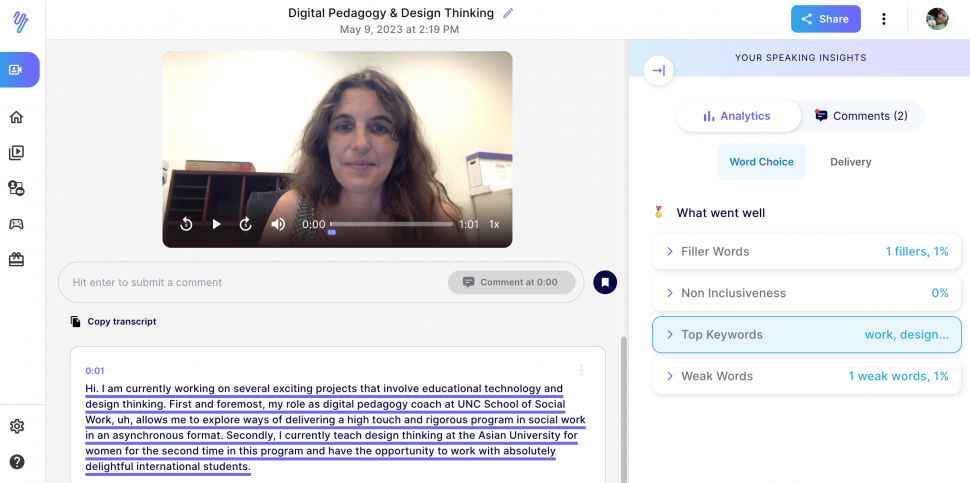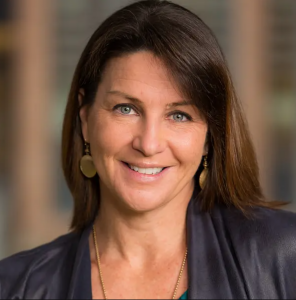Yoodli: Leveraging AI in Nursing Education. An Interview with Maureen Baker and Theresa Raphael-Grimm

Yoodli is a free presentation and interview coach that generates a transcript, identifies filler words, provides analytics and offers suggestions for improvements and follow-up questions.
Bard, ChatGPT, Midjourney and other artificial intelligence (AI) tools present instructors with new opportunities and challenges. A program at the UNC School of Nursing is using an AI-assisted video platform to provide rich feedback to students about their interpersonal communication skills. Maureen Baker from UNC School of Nursing and Theresa Raphael-Grimm from UNC Schools of Nursing and Medicine talk about their experience with the AI platform yoodli.
What were the main benefits of using yoodli to practice interview techniques with nursing students?
Theresa: Excellence in practice requires nurses to use effective interpersonal communication skills. Nurses interact with patients and their families at very vulnerable moments of life (and death). Teaching nurses how to effectively communicate is challenging. Yoodli provides us with a platform to capture interpersonal interactions on video, offers a written transcript of the interaction, offers feedback on basic communication skills, and allows faculty to provide additional feedback on the advanced skills taught in the course.
Maureen: Agree- It’s one thing to talk about therapeutic communication and it is another to be able to therapeutically communicate with others on the fly and be able to review such interactions. Yoodli allowed us to capture students practicing therapeutic communication techniques with their peers and provided a platform for formative evaluation. Students thrive on challenges, feedback, and opportunities to improve.
Yoodli was a great platform because everyone was actively involved in the learning activity. The interviewer, the interviewee, and the peers who commented on what went well, and room for improvement, as well as faculty giving feedback and encouragement as well.
Asking the right questions is hard work. In many professional contexts, it is crucial to find the right tone, attitude, and focus. What are specific learning goals for nursing students?
Theresa: The major learning goal is for students to practice Therapeutic Communication Skills based on the work of Hays and Larson. These skills are essential to eliciting critical health information and conveying empathy and respect to patients. Students conduct a focused interview with an assigned partner with the expectation that, while doing so, they demonstrate the therapeutic skills.
Maureen: A goal was also to shift students’ role from a social interaction to a professional interaction and illuminate areas to improve. For example, when a student interviewed a peer and the peer discussed having a relative who was cared for by a nurse- the social interaction would say “ Really? Me too!” whereas the professional response would be “Tell me more about that”.
Can you please describe the setting and background of using the AI tool? What was the class-size, how many faculty instructors were involved?
Theresa: The class had 115 students. It was an usual semester in that we had 4 faculty available to review the Yoodli videos. Typically, we will have 2-3 faculty and a TA. Because the class is so large, we need extra faculty to view and provide informed feedback. The students conduct two Yoodli interviews, one earlier and one later in the semester, giving them time to incorporate the feedback from their first attempt, into their subsequent interview.
Maureen: We learned about Yoodli from a colleague and thought it would take an existing interview assignment and add elements of accountability, reflection, and challenge and it delivered in all 3 ways! Infusing the technology into the assignment took considerable preparation in terms of step-by-step instructions – demo videos – but the students were intrigued and engaged and they did a phenomenal job executing what we asked of them.
What are typical interview mistakes you detected among your students? Did the AI tool make it easier to increase students’ awareness of their mistakes?
Theresa: Students struggle with making the transition from social interaction to therapeutic interaction. In professional interaction the focus is entirely directed to the patient and the patient’s experience. They find it difficult to avoid talking about themselves. They also struggle to avoid using judgment words like: “awesome” or “that’s great”. (In professional interactions, these words often keep patients from elaborating or talking about topics that are not so positive). Some students found the experience quite humbling in that many of them began the assignment thinking it would be easy but then were surprised to see their own interpersonal mistakes. In the second attempt, they were able to self-correct and improve their performance.
Did students or faculty experience any problems with using the technology? In other words: is a difficult?
Theresa: Because Dr. Baker is quite tech-savvy, it was fairly easy! During the yoodli exercise groups of four students were created. Each student created a video of themselves interviewing an assigned peer. Two other students in their “squad”, served as observers of the interaction and provided therapeutic communication feedback. This peer feedback was in addition to the Yoodli app AI-feedback and faculty feedback. The interviews were done during class time, making access to tech support readily available.
Maureen: I would not say difficult, I would say it required a lot of preparation and consideration of worst-case scenarios (once a nurse, always a nurse). So we were proactive in thinking about wifi issues- alternate ways to capture recording. Students spread out around the building and onto adjacent areas of campus to find quiet spaces to conduct their interviews. I gave all students my cell number to text if any issues. Four groups texted and the issue was resolved quickly. Also helped to have all four faculty roaming around campus on a gorgeous day to check on groups and give a thumbs up! Now we have the directional/how-to Yoodli road map- and our road map has been used in other courses as well.
Many educators perceive artificial intelligence as a threat to their teaching practices. What made you seek out the pedagogical opportunities of these new tools?
Theresa: Therapeutic Communication is difficult to teach and evaluate. We had been using written logs to do so. The logs were tedious, time consuming, and relied on student recollection to capture the dialog. It was a mediocre method, at best. Dr. Baker realized this and found the Yoodli. Using the Yoodli app was so much more efficient, effective and informative. (Maureen, can you elaborate here too).
Maureen: We seek to actively engage our students in meaningful learning. We are innovators and model how to innovate and learn from the process of continual quality improvement. AI is here and I think as educators we embrace it as a teaching tool and discuss pros, cons, ethical considerations, risks, benefits, and other applications with our students.
How do you see the future of your profession changing due to technological advances specifically in the area of artificial intelligence?
Theresa: For this project, it would be great if we could program the Yoodli to use the Therapeutic Communication Skills in providing additional, higher-level feedback to students.
Maureen: Providing opportunity for students to practice and grow into their professional practice. I think AI will impact the profession of nursing by allowing more time at the bedside, less at the computer charting or calling for services, and more time to impact patients and families using in person therapeutic communication. Yoodli proved to be an excellent tool in using technology to engage students in active learning and providing a platform for reflective practice and goal setting.
We hear quite a bit about pandemic learning loss as it pertains to K12 students. What deficits do university students have from your perspective coming out of the pandemic?
Theresa: Opportunities for face-to-face interactions are crucial to human well-being. The interpersonal skills necessary to create high quality human connection deeply enhance the user’s sense of comfort and effectiveness in interpersonal situations. Students need to be talking to each other, face-to-face, to fully experience the richness of human interaction. The pandemic caused, or exacerbated, loneliness. This project connects students, while giving them practice with essential professional skills. Through it, students not only learned course content but they reported a sense of having formed relationships that they otherwise would not have.
Maureen: We assumed students knew each other and we were wrong! They commented on interviewing peers who they do not sit next to, or do not know was a welcomed opportunity. The activity provided an exceptional platform to learn about students from different backgrounds and experiences before arriving at UNC (e.g. in state, out of state, suburban, rural, international, military).The mobile nature of the app was key in sending them outside the classroom and capitalized on a gorgeous Fall day and our stunning campus to sit outside in a different place- and flex their communication muscles.
What other subjects could adapt your teaching idea?
Theresa: Any area of study that requires effective interpersonal communication skills (journalism, marketing, business, medicine, dentistry, social work, drama, etc.) would benefit.
Maureen: I use the technology in a DNP course I teach on professional communication. Applications for international collaborations exist as well.
About
 Maureen Baker
Maureen Baker
Dr. Baker is passionate about nursing education and inspiring the next generation of nurses to elevate the art and science of nursing. As an Apple Distinguished Educator, she leads the UNC SON EmpowerEd program, using iPads to leverage nursing education, student engagement, and student scholarly productivity. Dr. Bakers areas of research are patient engagement and innovation in nursing education.
 Theresa Raphael-Grimm
Theresa Raphael-Grimm
Dr. Raphael-Grimm is a practicing psychotherapist with 37 years of experience in individual and couples therapy. She serves as the Associate Director of the Taking Care of Our Own Program in physician wellness in the UNC School of Medicine Department of Psychiatry. She is a seasoned, award-winning educator with a focus on interpersonal communication in healthcare. Her research interests include biases and stereotypes and their influence on patient-provider relationships.
